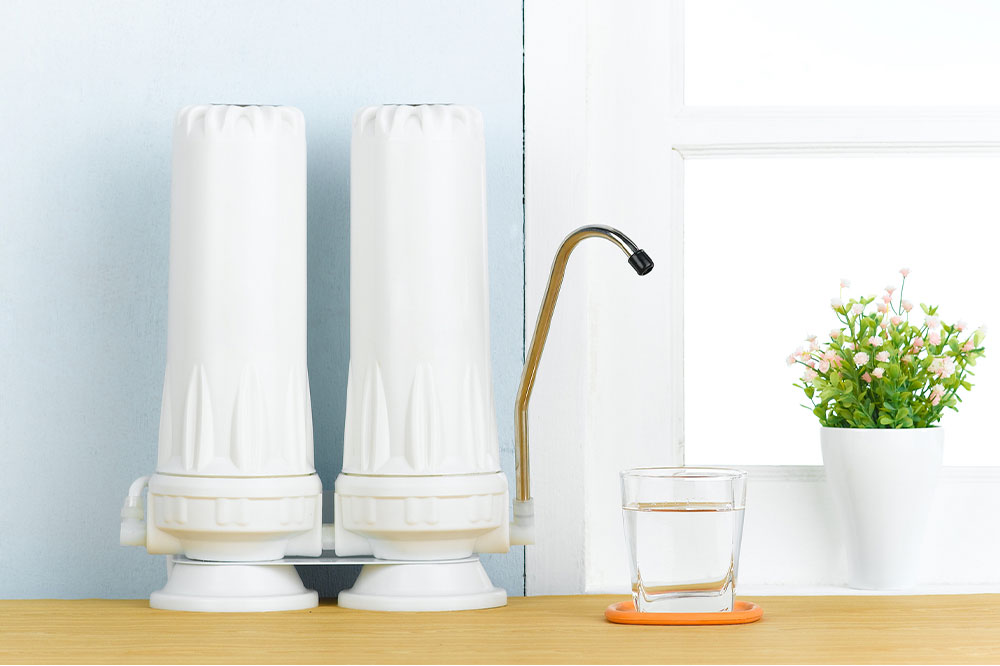Understanding the difference between water filters and purifiers
With only 1.2% of the Earth’s freshwater fit to drink, finding drinkable water is challenging. Thankfully, technology has some befitting solutions that can enhance the quality of water we consume daily. Water filters & purifiers have become essential home appliances today. Often used interchangeably, these water purification systems have a few differences in their processes. Let us understand the difference between the two to help you make wise choices when buying one for your home.
Difference between water filters & purifiers
Both water filters and water purifiers are used to remove impurities from the water.

Water filters
Water filters work on the principle of filtration. They are equipped with filters or physical barriers to stop the contaminants from passing, allowing only the water to pass through. A water filter will have different types of filters to block off sand, silt, rust, heavy sediments, water-soluble heavy metals, pesticides, chlorine, PFOA, scale build-up, and other chemical compounds.
Uses
- These are effective in removing microscopic particles that are either physical or biological. These gadgets may not be quite effective in removing chemical contaminants.
- Filters can effectively block organisms like microbial cysts and bacteria. Viruses, chemicals, and bacterial toxins may not, however, pass through the filter pores.
- They also contribute to enhancing the water texture.
Types
- Whole house filters help with water treatment for the entire house. The main water line is fitted with this type of filter. There are filters to stop sediments, minerals like copper and zinc, algae, and carbon or UV filters to stop pesticides and other chemical compounds. These are customizable.
- Point-of-use filters or drinking filters are fitted to get clean water for drinking purposes. These filters are usually attached to the tap or under the sink and come with activated carbon.
- Shower filters are attached to the shower head. This filter type is the most useful in areas with hard water.
Water purifiers
Water purification systems mainly focus on the removal of biological contaminants of varied sizes and electrical charges.
Uses
- It helps remove all major impurities from the water with processes like distillation, deionization, UV treatment, and reverse osmosis.
- Biological contaminants like bacteria and protozoa are killed using metals like chlorine or iodine.
- The success rate of water purifiers is usually 95% or above.
- It helps improve the taste, texture, and consistency of water.
Types
- Water purifiers working with reverse osmosis
- These purifiers are fitted with a semi-permeable membrane, almost four or five membranes that help stop contaminants with larger particles. This process helps clean the water by nearly 99%.
- Water purifiers working on the distillation process
- In this case, the water is boiled. During the process, the contaminants are left behind while the steam is collected as purified water. The process helps kill biological contaminants like bacteria.
Water filters & purifiers – Key differences
Types of impurities
Water filters are the most effective in removing physical contaminants like sediments, dust, dirt, clay, etc. Filters also remove suspended particles and block certain types of bacteria and viruses. Chemical impurities, metals, and dissolved solids may not get effectively removed using filters.
Water purifiers are excellent in blocking off physical sediments and impurities. They can also remove biological contaminants like bacteria, viruses, and protozoa. Harmful chemicals are blocked off, and so are pesticides, TDS, and heavy metals.
The basic function
Water filters help clean the water, which means that all visible impurities are effectively removed.
Water purifiers remove visible and invisible impurities during the process of purifying the water.
Purification level
Water filters are generally good for the basic cleaning of water. The water can then be used effectively for most of the household chores.
Water purifiers use reverse osmosis and distillation processes. The output water is safe for drinking as purifiers can clean almost 99% of impurities in the water.
Location for use
Water filters are best suited for places where the water has fewer chemical and biological impurities. If you live in a place where the water is natural and the local authorities treat the water, you can go in for filters. On the other hand, water purifiers are suitable for places affected by water pollution.
Investing in a water filter or water purifier entails understanding the water quality at your location and accordingly making a decision. With the advent of technology, water filters and purifiers have smart features like alert systems and indicators. Consult an expert before making a purchase.

